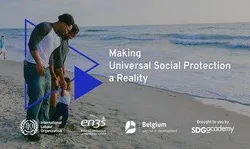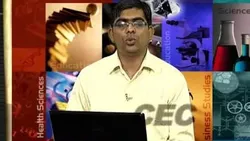
Making Universal Social Protection a Reality 
This course focuses on making universal social protection a reality. It highlights the right of every individual to social security, as outlined in the Universal Declaration of Human Rights. Despite this, only 46.9% of the global population currently has access to social protection. The course aims to address this issue and ensure that all people have access to the social security they are entitled to. ▼
ADVERTISEMENT
Course Feature
![]() Cost:
Cost:
Free
![]() Provider:
Provider:
Edx
![]() Certificate:
Certificate:
Paid Certification
![]() Language:
Language:
English
![]() Start Date:
Start Date:
Self paced
Course Overview
❗The content presented here is sourced directly from Edx platform. For comprehensive course details, including enrollment information, simply click on the 'Go to class' link on our website.
Updated in [February 21st, 2023]
Everyone, as a member of society, has the right to social security (Art. 22 of the Universal Declaration of Human Rights), regardless of where they live or who they are, simply because they are human beings. Yet, only 46.9 per cent of the global population are effectively covered by at least one social protection benefit, while the remaining 53.1 per cent are left entirely unprotected. This means that despite the progress made in many countries of expanding provisions, 4.1 billion people must still fend for themselves when their health, incomes or jobs are at risk, instead of all people standing together in solidarity and collectively ensuring that no one is unprotected. Even fewer people enjoy comprehensive protection against the whole range of risks and challenges which may occur over the life cycle, such as maternity, raising children, sickness, unemployment and disability benefits, old-age pensions as well as social health protection. Such comprehensive protection is needed for a dignified life, through entitlements solidly anchored in national law, providing people with peace of mind secure in the knowledge they can access adequate benefits and services if and when they need them.
In addition to being a human right, social security is a socio-economic necessity. It prevents or at least alleviates poverty and reduces vulnerability, social exclusion and inequality. From an economic standpoint, a healthier and better-educated workforce is more productive, supporting inclusive and sustainable growth. Social protection stimulates aggregate demand during economic recessions, thereby acting as an economic stabilizer, and facilitates and smoothens structural transformations, for instance from carbon-intensive to carbon-free sectors, by ensuring that workers have adequate support during these transitions.
This MOOC provides an introduction to social protection, its main concepts, needs for social protection and coverage over the life cycle, the basics of the design and implementation of social protection systems, including floors, and the central role of social protection in confronting the major challenges that the world is facing.
The MOOC enables learners to understand the key social protection concepts and the strengths and weaknesses of different approaches to social protection. It also provides participants with critical insights into policy options and social protection strategies in the context of decent work and general socio-economic development.
This course provides a useful resource for policy makers, social partners, civil society organizations, development actors, university students and others who may or may not be directly involved in social protection issues but who work or are likely to work in a related field such as development cooperation, public finances, economic and social development, rural development, environmental issues, etc.
This MOOC has been produced by the International Labour Organization (ILO) in collaboration with the French National Social Security School ( l'Ecole nationale superieure de Securite sociale or EN3S). It builds on ILO knowledge and field experience on the development of universal social protection systems based on the application of international social security standards, particularly the Social Security (Minimum Standards) Convention, 1952 (No. 102), and the Social Protection Floors Recommendation, 2012 (No. 202).
(Please note that we obtained the following content based on information that users may want to know, such as skills, applicable scenarios, future development, etc., combined with AI tools, and have been manually reviewed)
Learners can learn from this course about the importance of social protection, its key concepts, and the strengths and weaknesses of different approaches to social protection. They can also gain an understanding of the design and implementation of social protection systems, including floors, and the role of social protection in confronting global challenges. Additionally, learners can gain critical insights into policy options and social protection strategies in the context of decent work and general socio-economic development. Finally, they can learn about the ILO's knowledge and field experience on the development of universal social protection systems based on the application of international social security standards.
Course Provider

Provider Edx's Stats at AZClass
Discussion and Reviews
0.0 (Based on 0 reviews)
Explore Similar Online Courses

XML Short Course Step by Step for Beginners

How to Create an iOS App (without Coding) - Ecommerce App Tutorial

Python for Informatics: Exploring Information

Social Network Analysis

Introduction to Systematic Review and Meta-Analysis

The Analytics Edge

DCO042 - Python For Informatics

Causal Diagrams: Draw Your Assumptions Before Your Conclusions

Whole genome sequencing of bacterial genomes - tools and applications

The Ideal of Self-Governance: Public Policy Beyond Markets and States

Public Administration

Compelling Narratives for Complex Decisions: Policy Analyst Fundamentals
 Related Categories
Related Categories
 Popular Providers
Popular Providers
Quiz
 Submitted Sucessfully
Submitted Sucessfully
1. What is the main purpose of social protection?
2. What is the Social Security (Minimum Standards) Convention, 1952 (No. 102)?
3. What is the Social Protection Floors Recommendation, 2012 (No. 202)?
4. Who is this MOOC produced by?


Start your review of Making Universal Social Protection a Reality